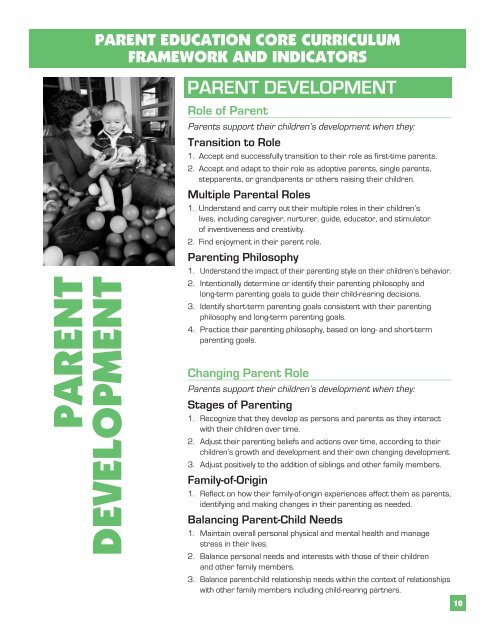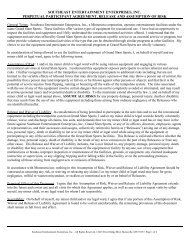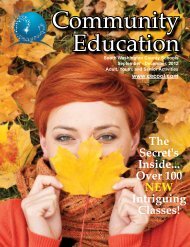Parent Education Core Curriculum Framework 2011.pdf - mnafee
Parent Education Core Curriculum Framework 2011.pdf - mnafee
Parent Education Core Curriculum Framework 2011.pdf - mnafee
You also want an ePaper? Increase the reach of your titles
YUMPU automatically turns print PDFs into web optimized ePapers that Google loves.
PARENT EDUCATION CORE CURRICULUM<br />
FRAMEWORK AND INDICATORS<br />
PARENT<br />
DEVELOPMENT<br />
PARENT DEVELOPMENT<br />
Role of <strong>Parent</strong><br />
<strong>Parent</strong>s support their children’s development when they:<br />
Transition to Role<br />
1. Accept and successfully transition to their role as first-time parents.<br />
2. Accept and adapt to their role as adoptive parents, single parents,<br />
stepparents, or grandparents or others raising their children.<br />
Multiple <strong>Parent</strong>al Roles<br />
1. Understand and carry out their multiple roles in their children’s<br />
lives, including caregiver, nurturer, guide, educator, and stimulator<br />
of inventiveness and creativity.<br />
2. Find enjoyment in their parent role.<br />
<strong>Parent</strong>ing Philosophy<br />
1. Understand the impact of their parenting style on their children’s behavior.<br />
2. Intentionally determine or identify their parenting philosophy and<br />
long-term parenting goals to guide their child-rearing decisions.<br />
3. Identify short-term parenting goals consistent with their parenting<br />
philosophy and long-term parenting goals.<br />
4. Practice their parenting philosophy, based on long- and short-term<br />
parenting goals.<br />
Changing <strong>Parent</strong> Role<br />
<strong>Parent</strong>s support their children’s development when they:<br />
Stages of <strong>Parent</strong>ing<br />
1. Recognize that they develop as persons and parents as they interact<br />
with their children over time.<br />
2. Adjust their parenting beliefs and actions over time, according to their<br />
children’s growth and development and their own changing development.<br />
3. Adjust positively to the addition of siblings and other family members.<br />
Family-of-Origin<br />
1. Reflect on how their family-of-origin experiences affect them as parents,<br />
identifying and making changes in their parenting as needed.<br />
Balancing <strong>Parent</strong>-Child Needs<br />
1. Maintain overall personal physical and mental health and manage<br />
stress in their lives.<br />
2. Balance personal needs and interests with those of their children<br />
and other family members.<br />
3. Balance parent-child relationship needs within the context of relationships<br />
with other family members including child-rearing partners.<br />
10





